Keeping the Vjosa River Wild
Air Date: Week of June 6, 2025
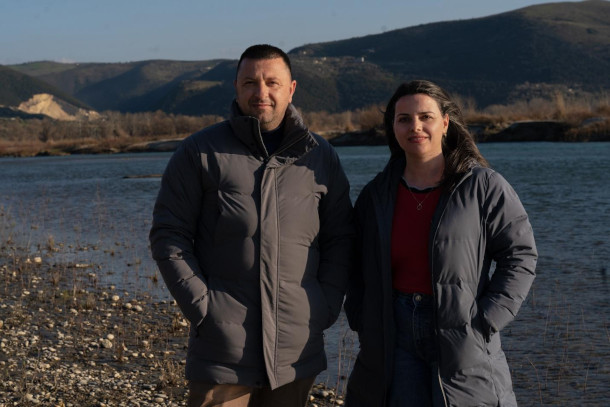
2025 Goldman Prize winners Besjana Guri and Olsi Nika. In 2014, they publicly launched the “Save the Blue Heart of Europe” campaign to protect the Vjosa River from a hydropower dam development boom. Their activism resulted in its historic designation as the Vjosa Wild River National Park by the Albanian government in March 2023. This safeguards the Vjosa, which flows freely 167 miles from the Pindus mountains to the Adriatic Sea, and also its free-flowing tributaries. (Photo: Goldman Environmental Prize)
The small Balkan nation of Albania already produces 99% of its electricity from hydropower and has plans to become a major exporter of hydro, threatening some of the last free-flowing rivers in Europe including the Vjosa. The 2025 Goldman Environmental Prize winners for Europe were able to stop a dam on the Vjosa River and convince the government to designate Vjosa Wild River National Park. Co-recipient Besjana Guri joins Host Jenni Doering to share how they achieved this victory.
Transcript
DOERING: While countries like the United States are seeking energy independence by expanding oil and gas production, the small Balkan country of Albania is following a more fossil-fuel-free approach. The country already produces ninety nine percent of its energy from hydro-power and it has plans to become a major exporter of hydro by building as many as three thousand dams. But that clean energy can come at a cost to freshwater ecosystems by blocking fish migration and turning wild rivers into sluggish reservoirs. One of the last remaining free-flowing rivers in Europe is the Vjosa, which runs one hundred and sixty-seven miles from the Pindus Mountains in Greece through Albania to the Adriatic Sea. 2025 Goldman Environmental Prize winners for Europe, Besjana Guri and Olsi Nika, recognized the Vjosa as a biodiverse jewel worth protecting. So they led a group of campaigners who successfully fought to keep the Vjosa from being dammed for hydropower. And in March 2023, the government of Albania designated the Vjosa Wild River National Park, protecting both the river itself as well as its vital tributaries. Besi told me the park is a national treasure.
GURI: There's so many activities that you can do in the river. And what's also very important outside the river, there is plenty of activities, but the river itself gives you, you know, time to relax with your family or with your friends. You can swim there, you can do rafting, or you can walk along the river. And the river itself is very reachable, even by bus or by car, by bike. So it's really accessible. But what's also important is that the whole valley is very interesting. The cities along the Vjosa are really nice and cute cities. You also have World Heritage cities like Gjirokastër, for instance, and the delta of the Vjosa, where you can do bird watching. You can watch the flamingos there and the pelicans. It's really, it's a mosaic of natural beauty.
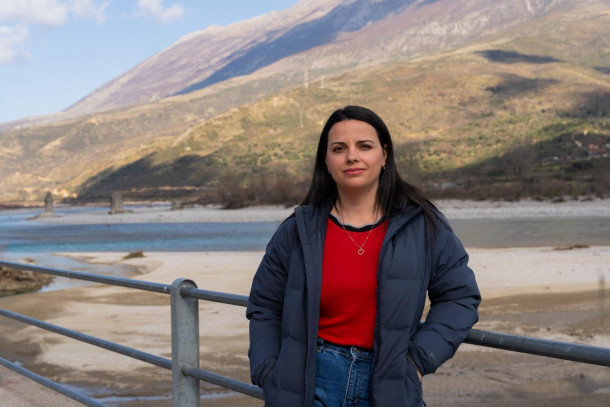
2025 Goldman Prize winner Besjana (Besi) Guri, 37, was trained as a social worker and has always had a strong connection with nature. Besi, whose expertise is communications, has worked closely with Olsi at the NGO, EcoAlbania, on the campaign to stop the Albanian government from building hydro dams on the Vjosa. (Photo: Goldman Environmental Prize)
DOERING: So what was the government of Albania weighing, in terms of, you know, the pros of making this designation to protect the Vjosa River and create this Wild River National Park, versus what was, on the other hand, that they were balancing and trying to weigh? How hard was it for them to make this decision?
GURI: Well, since when we started the campaign, there were plans to develop hydropower, to build hydropower projects in the Vjosa, we started our fight, fighting a single one, one project, the Kalivaç Hydropower. That was already a concession. That was a big dam. The work had started, but luckily stopped some years before we publicly started to fight. But on the way, we learned that there were eight in the main river and thirty-something more in the tributary, so a total of 45 hydropower. So our government definitely had big plans for hydro energy in the Vjosa, and it wasn't really easy for them to change course. And also for us, it was really hard to make them change the course. I'm bringing here to attention that in that time that we were starting, we're speaking about 2012-13, Albania had this vision to develop the hydro and to be also a superpower in the Balkans for energy production. So everything looked like it's a good thing, you know, it's a green energy, and we want to develop the country and so on. And even the people, they didn't really understand what is so bad about the hydropower and why we should protect nature and why we should have the Vjosa free flowing. So it wasn't really easy to convince them. We found our ways, but it was a long way, of course.
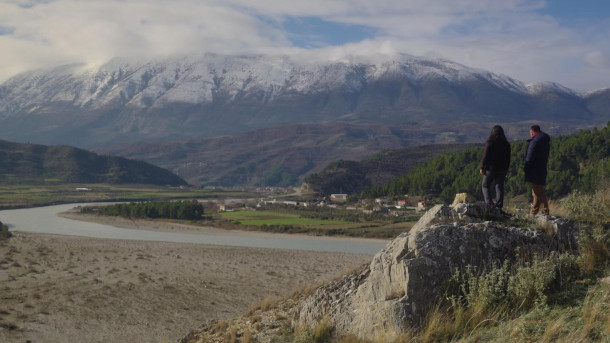
Besjana Guri and Olsi Nika look out over the Vjosa River, which is fed by 250 miles of tributaries. As part of the Save the Blue Heart of Europe campaign, the two argued that dams would irreversibly damage the ecology of the Vjosa river system. (Photo: Adrian Guri for the Goldman Environmental Prize)
DOERING: They must be a testament to the effort that you put in to building a grassroots movement here. You know, working with the local communities and really communicating with the government about the benefits of protecting this. I mean, you know, a lot of the time when there are business interests, development interests, up against environmental preservation interests, the business interests often win out. What do you think helped you succeed?
GURI: Our vision was stop the dams, declare a national park. So that's how we started everything, but that was really a vision at that time, and sometimes it even felt like really not very possible to achieve. But we stick to the plan, and throughout the whole time, we managed to bring in scientific arguments why the Vjosa is so unique and why it should be protected, and we try to convince our government that they should first study the river, assess what they have, and then take decision for the fate of the river. Because when you lose it, you lose it forever. When you interrupt the free flowing river and you put a dam in it, then it's gone. The vision for a Wild River National Park is gone. We built a multi tool campaign, I would say, and we also made our government's life impossible, because everywhere they would go, they would hear about the Vjosa. “National Park” sometimes to people is translated to restrictions. But in the Vjosa case, we had a supportive community that were on the front line with us, or we were on the front line with them, and they understood that a national park would bring them much more possibilities than the hydropower, and they saw the threat is there, so they were really strong, having petitions, having protests, being in court cases with us. We won first environmental court case in Albania for Vjosa. As a country, Albania had no precedent of environmental cases in the court, and the Vjosa was the first one, and opened the way for many other cases.
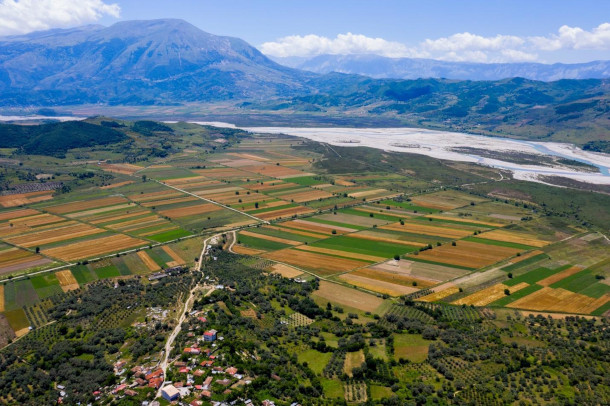
The village of Kutë sits alongside the Vjosa River in southeastern Albania. Residents in the small rural community depend on the waterway for farming, fishing and tourism. (Photo: Adrian Guri for the Goldman Environmental Prize)
DOERING: Albania does generate 99% of its electricity from hydroelectric power. That's a renewable resource. It doesn't involve burning fossil fuels, but there are ecological impacts from dams. Talk to us about the delicate balance there between humanity's need for clean energy while preserving wild nature.
GURI: It's weird because we as a country, we have 300 and something days of sun, so almost all year we have a lot of sun, and Albania could use that. We also have potential for wind power, and that's one of the arguments that we've been using with our government. Why do we want to exploit all the rivers? Why do you want to destroy all the rivers? Well, you can use alternatives, and that's what, what I think that is the best. We need to change our habits, on the way we live and on the way how we use energy, but we need to find the balance and to use different alternatives, because even depending on hydro is not that sustainable at all. For instance, in the dry season, Albania still imports energy. So when you have a lot of production, you export it. In the end, it's about business. It's not about energy. That's the problem.
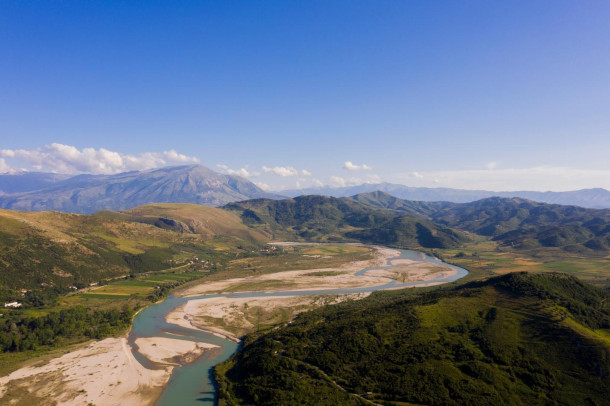
Pocem, Albania, sits along the Vjosa as it winds 167 miles from the Pindus mountains in Greece to the Adriatic Sea. Pocem is known for its agriculture and historical sites. Save the Blue Heart of Europe campaigners argued that damming the river would destroy the rich biodiversity of the Vjosa and its tributaries. (Photo: Adrian Guri for the Goldman Environmental Prize)
DOERING: A lot of people involved in making this possible, but of course, you and your co-recipient, Olsie Nika, are the Goldman Environmental Prize recipients for Europe in 2025. How does it feel to be a Goldman prize winner? And what does the award mean to you?
GURI: I'm very honored, and so so happy to have been acknowledged with the prize. It's really something special for me. But what it's really makes me think that even when you don't think that people are watching you, you know, it's important that you do what you do with the passion, and there will come a moment that others will see what you're doing.
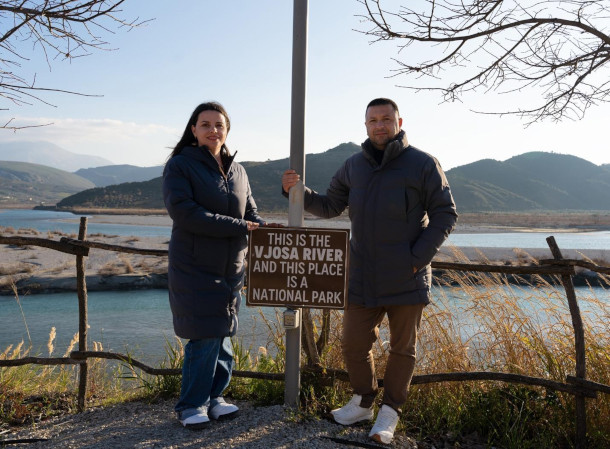
2025 Goldman Prize winners Besjana Guri and Olsi Nika at a sign designating the Vjosa Wild River National Park (Photo: Goldman Environmental Prize)
DOERING: Besjana Guri and her colleague Olsi Nika are the 2025 co-recipients of the Goldman Environmental Prize for Europe. Thank you so much, Besi, it's been such a pleasure.
GURI: Thank you for having me. It was my pleasure.
Links
Learn more from the Goldman Prize website
Balkan Rivers | “2025 Goldman Environmental Prize for EcoAlbania's Besjana Guri and Olsi Nika”
Gear Junkie | “Save the Vjosa River: Albanians Fight Damming & Diversion in Patagonia Short Film”
Goldman Environmental Prize’s Video on Besjana Guri and Olsi Nika
EcoAlbania | “Vjosa: A Global Inspiration — Albanian Activists Honored with the Green Nobel Prize!”
Living on Earth wants to hear from you!
Living on Earth
62 Calef Highway, Suite 212
Lee, NH 03861
Telephone: 617-287-4121
E-mail: comments@loe.org
Newsletter [Click here]
Donate to Living on Earth!
Living on Earth is an independent media program and relies entirely on contributions from listeners and institutions supporting public service. Please donate now to preserve an independent environmental voice.
NewsletterLiving on Earth offers a weekly delivery of the show's rundown to your mailbox. Sign up for our newsletter today!
 Sailors For The Sea: Be the change you want to sea.
Sailors For The Sea: Be the change you want to sea.
 The Grantham Foundation for the Protection of the Environment: Committed to protecting and improving the health of the global environment.
The Grantham Foundation for the Protection of the Environment: Committed to protecting and improving the health of the global environment.
 Contribute to Living on Earth and receive, as our gift to you, an archival print of one of Mark Seth Lender's extraordinary wildlife photographs. Follow the link to see Mark's current collection of photographs.
Contribute to Living on Earth and receive, as our gift to you, an archival print of one of Mark Seth Lender's extraordinary wildlife photographs. Follow the link to see Mark's current collection of photographs.
 Buy a signed copy of Mark Seth Lender's book Smeagull the Seagull & support Living on Earth
Buy a signed copy of Mark Seth Lender's book Smeagull the Seagull & support Living on Earth

